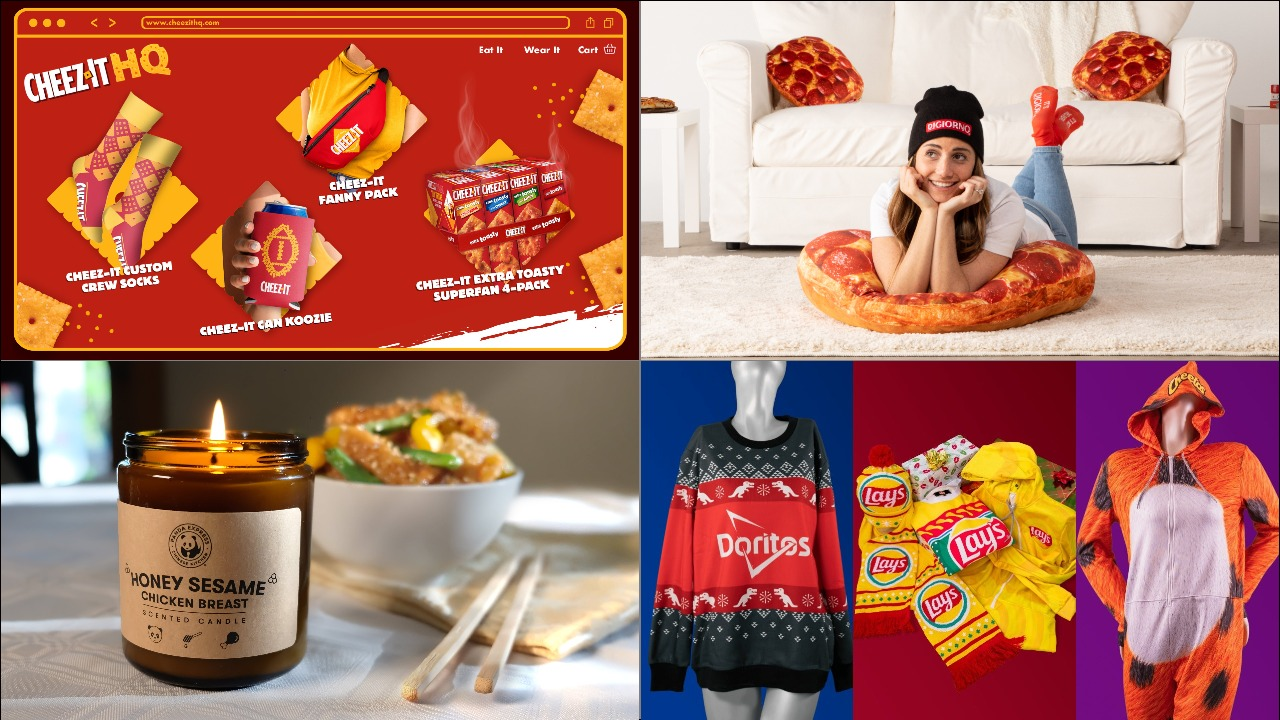Why Is Every Food Brand Selling Weird Swag In Online Shops?
It's not just about making a little extra money by selling novelty socks—there's a bigger picture here.
We may receive a commission on purchases made from links.
In our glorious modern age, it's easy to celebrate our love of late-stage capitalism and multi-national conglomerates with swag that makes us look good and lets us live our best lives. Want to show off your beach bod while also publicly declaring your undying love for Arby's? A "Beefy Aloha" swimsuit will take care of that. Have you found someone to love as truly, madly, and deeply as you love Taco Bell? Slip a hot sauce packet garter under your wedding dress before walking down the aisle. Need to get away from the turmoil of daily life and spend more time with the brands that really matter? Slip into a hot bubble bath, light a few Panda Express Honey Scented Chicken-scented candles, pamper yourself with a Honey Baked Ham spa kit, and let all your cares slip away. It's the Supreme Era Of The Online Swag Shop, and seemingly every brand is in on the game.
Is there anything more emblematic of our current moment in history than the ability to fork over our hard-earned money to mega-conglomerates so that we may advertise their brands on our bodies, our homes, our flesh? Well, actually, yes, there is: While we had initially thought that all these branded online stores were solely a scheme to have us do all their advertising for them, a recent AdAge article points out that this direct-to-consumer business actually serves another much more valuable purpose: collecting massive amounts of consumer data.
For decades now, companies have used cutesy-named "cookies" to monitor us online, tracking our activities to learn what makes us tick, and using that information to encourage us to buy their products. But the age of cookies is coming to an end, as Google will be banishing third-party cookies from its Chrome browser in 2023. This means companies need to find new, inventive ways to gather that data on us, like convincing us to download their rewards member apps with promises of deals and discounts. Or, as is the case with online merch shops, luring us to their websites to voluntarily offer up our personal information at checkout.
Last week, parent company Kellogg's opened an online swag shop dedicated to Cheez-Its, featuring branded fanny packs, wine tumblers, and a $140 adult onesie that comes with matching socks and a cozy fleece blanket. Was the public really demanding a $140 adult onesie covered in Cheez-It boxes? Maybe not, but it's worthwhile for Kellogg's to throw it into an online store anyway, because seeing which users gravitate toward it is priceless.
"The best focus group you could ever get is people actually going out and paying for something," Jordan Narducci, Kellogg's director of global direct-to-consumer e-commerce, told AdAge. "It's only going to get harder and harder for us to purchase data... [and] first-party data is one of the biggest drivers of media efficiency across our organization."
Last year, AdAge spoke to PepsiCo's chief growth officer Michael Lindsey about the company's forays into direct-to-consumer online shops. Lindsey said there is "no substitute for having a firsthand relationship with a consumer who's purchasing directly from you and telling you exactly what they want to buy." Which is true! In addition to its iconic cola, PepsiCo owns 23 brands and, shockingly, controls nearly 90% of the dip market. They need to know which beverages and dips people are actually craving, and what else they might be itching to buy.
No matter what our feelings are about all these Big Brother-esque shenanigans, these direct-to-consumer tactics are only going to become more popular with major corporations who build their businesses on mountains of our personal data. At the very, very least, it's fun to be offered up novelty fanny packs and scented candles while they do so. Heh heh heh, this pillow looks like a pizza. These Crocs look like fried chicken. This all looks like the future.
